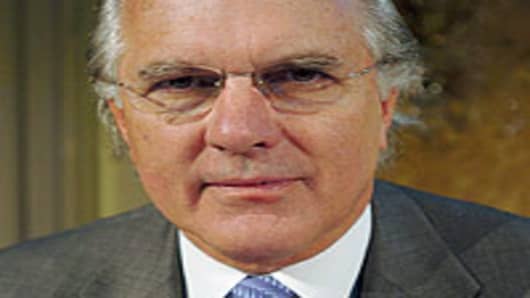The Federal Reserve needs the help of fiscal and regulatory authorities if it is to help the US economy grow at a faster pace, Richard Fisher, President of the Federal Reserve Bank of Dallas, told CNBC Monday.
The US will not end up like Japan, which fought deflation and economic stagnation for more than a decade despite keeping interest rates very low for a very long period of time, Fisher said.
Recently, St. Louis Fed President James Bullard told CNBC that the central bank faced a "tough" decision regarding the future buying of assets, also known as quantitative easing.
The Fed's mandate is to fight both steep rises in prices and decreases that may cause economic contraction, Fisher said, adding that the Federal Open Market Committee (FOMC) members will be the ones to ultimately decide on future action.
"This is a deliberative body and we haven't met yet," Fisher said. "I'm not going to comment one way or another because I'm just part of the discussion."
But regulators and the fiscal authorities need to help the central bank, he added.
"I do believe we would be still more effective than we had been if there was less confusion about what regulation is going to be," Fisher said.
Mexico's recent issuance of 100-year bonds shows that there is no problem with the bond market, he added.
"There's a lot of liquidity out there, we're well aware of that," Fisher said.
Fed officials are worried "a great deal" about unemployment, which is too high, and the "noise" that comes from fiscal and regulatory authorities should "get out of the way," he added.
"I think it's very, very important that you incentivize the people that hire," Fisher said, adding that companies are "in a defensive crouch still."
In September, nonfarm payrolls dropped by a larger-than-expected 95,000 while the unemployment rate remained flat at 9.6 percent.
"We may or may not pursue accommodation … that's not what businesses are complaining about," Fisher said. "The Fed can't do it alone."
US companies will take the money and invest elsewhere, where fiscal and regulatory authorities are "more friendly," he added.
"We're not a substitute for the fiscal authorities, we're a monetary authority," Fisher said. "What they're going to have to do is incentivize business, that means incentivize work."
He did not specify what incentives the government could offer, but said that the best way to do it would be one in which investors would not get scared about debts piling up over time.
Although a decision to buy more assets is not a given, the FOMC has some room for maneuver, according to Fisher.
"The last numbers that came out about CPI, they were quite anemic," he said.


